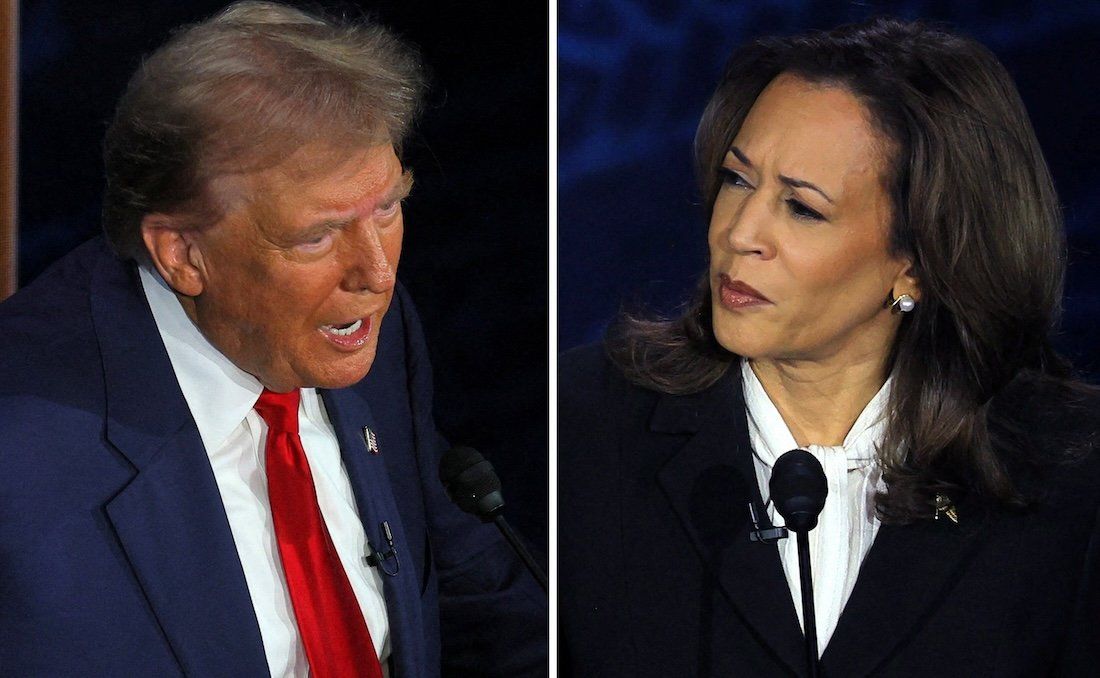Vice President Kamala Harris had two opponents in Tuesday night’s highly anticipated presidential debate: former President Donald Trump and high expectations. She performed well against both.
Harris successfully put Trump on the defensive throughout much of the debate, ripping into him on issues ranging from abortion and his criminal record to Jan. 6 and his refusal to accept the 2020 election results.
“Trump was fired by 81 million people," Harris said in reference to 2020. “Clearly, he is having a very difficult time processing that.”
Meanwhile, Trump used the debate to play his greatest hits, offering doom and gloom messaging about immigration, crime, and the “radical left.” The former president, for example, said that Harris wanted to see “transgender operations on illegal aliens that are in prison.” Trump also veered into the bizarre and conspiratorial, pushing baseless assertions about immigrants eating pets.
Harris seemed to anticipate this approach and laid into Trump for recycling talking points he’s leaned on for years. “It is important that we move forward – that we turn the page on this same old tired rhetoric,” Harris said.
She explained how military leaders had described Trump to her as a “disgrace.” And when Trump attacked President Joe Biden, Harris fired back, saying, “You're not running against Joe Biden. You are running against me.”
Throughout the debate, Trump struggled to stay on topic and rarely answered questions directly. When asked about the war in Gaza, he focused instead on Russia’s invasion of Ukraine – saying it never would’ve happened under his watch (Please note: There was also an ongoing war in eastern Ukraine involving Kremlin-backed rebels throughout his presidency).
Harris also got Trump to veer away from talking about immigration, an issue that’s been the former president’s bread and butter since his 2016 campaign, by suggesting that people leave his rallies early out of boredom. Trump took the bait, going on to boast that he has the “biggest” and “most incredible” rallies in response to a question about his role in killing a bipartisan bill to strengthen border security.
Trump repeatedly came off as unprepared. When asked about health care, he openly admitted he didn’t have a plan, other than wanting to replace Obamacare. “We are looking at different plans,” Trump said. “I have concepts of a plan.”
Though some of Harris’s responses came across as scripted, she largely stuck to one key message throughout the night — portraying herself as a new generation of leadership who would turn the page on a historically divisive era in US politics. That said, the debate often lacked specifics on policy — as both candidates traded barbs and sought to portray the other as a danger to the US. “You believe in things that the American people don't believe in,” Trump said to Harris in his closing remarks, decrying her as “the worst vice president in the history of our country.”
After the debate, Trump allies appeared unimpressed by what they saw from him — with Republican Sen. Lindsey Graham describing the night as a "missed opportunity" for the former president.
Whether Harris won over any new voters remains to be seen, but her campaign is clearly feeling energized by the vice president’s performance and has already signaled a desire to participate in a second debate with Trump. In comments to reporters in the spin room on the prospect of another debate, Trump said, “We’ll look at it, but they want a second debate because they lost.”
Ian Bremmersays that Harris won the debate. And Taylor Swift, who endorsed Harris after the debate, seemingly concurs with this assessment. Do you agree? We’d love to hear from you here.
Also, please join our X Space today on the debate. We’ll start at 11 a.m. EST. Set a reminder or join here.
